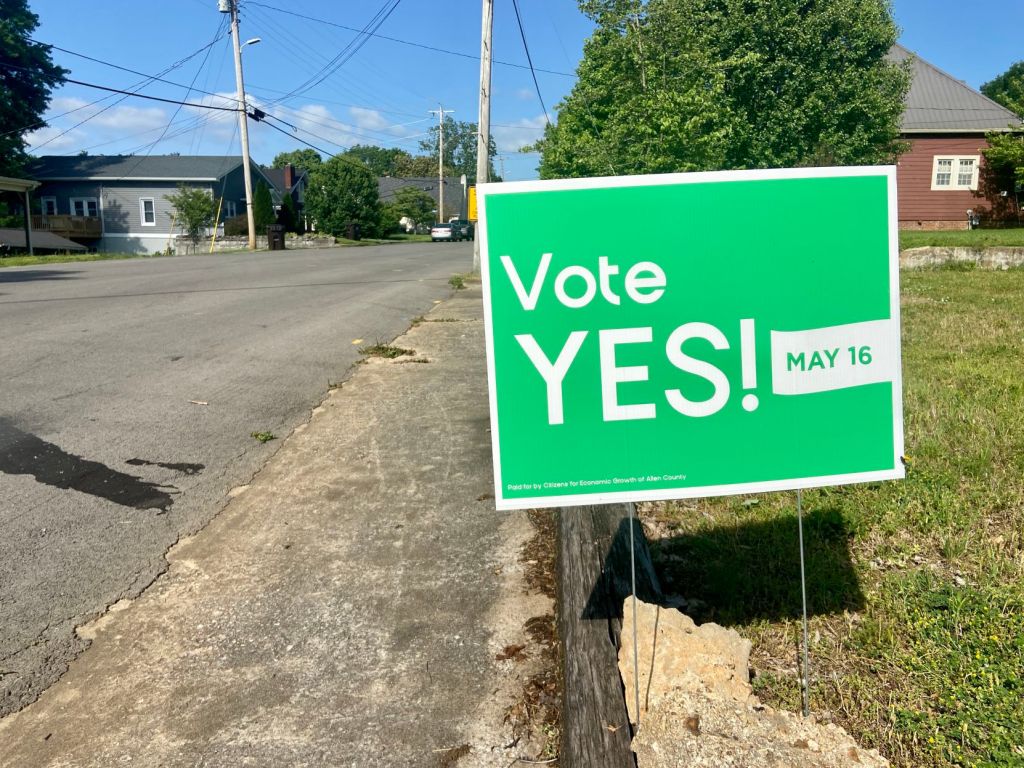Allen County faces contentious wet-dry vote
Published 8:00 am Thursday, May 11, 2023

- A Scottsville resident displays a Vote Yes sign in their front yard to show their support for a vote to allow alcohol sales in Allen County.
SCOTTSVILLE — Miles outside of Scottsville city limits, drivers may begin to notice a series of bright red “Vote No To Alcohol Sales” signs, mixed in with the occasional green “Vote Yes!” sign.
The signs increase in frequency as the city gets closer, advertising in dozens of front yards, churches and business fronts.
Trending
On May 16, Allen County residents will vote whether to turn it from a “dry” county that doesn’t allow the sale of alcohol in its borders to a “wet” one that does permit alcohol sales.
A yes vote is a vote for a “wet” Allen County, and a no vote will keep it “dry.”
The issue has been contentious. Local churches have been holding nightly prayer services on the issue, asking their congregations to vote no because of the dangers of alcohol.
Robert Herrington, who runs the Allen County Citizens for Economic Growth Facebook page, said that some who support alcohol sales are afraid to say anything because it leaves them vulnerable to public attacks or boycotts of their business.
Danny Patrick, pastor of East Willow Church of God, one of the churches holding services, said that he hates the community division the issue has caused.
“We don’t believe that alcohol is is a good fixture for our community,” Patrick said. “I’ve been raised all my life to believe that that was wrong, and I still believe it’s wrong. But we’re not against those people. We just don’t want alcohol in our community.”
Trending
“Yes” voters say that trying to prevent the ills of alcohol in Allen County is pointless, and the county might as well benefit economically from alcohol sales.
“All the counties around this are wet anyways, so there’s no reason not to,” said Jonathan Turner. “We could potentially open more restaurants, get more people to come to this town. I hate to say it, but the only negative would be if there were people who drink and drive, but we have a good local law enforcement office that helps with that.”
According to state law, while alcohol sales taxes go to the state, localities are allowed to establish certain licensing and regulatory fees for businesses selling alcohol.
For example. cities and counties can levy up to a 5% regulatory license fee on a businesses’ total revenue from alcoholic beverages, according to KRS 243.075.
The fee stays local. It is divided between a local Alcohol Beverage Control commissioner that enforces rules and local law enforcement, for additional resources.
Potentially, the extra money going to law enforcement from alcohol sales can free up city and county funds that usually go to law enforcement to pay for other local needs, Herrington said.
The vote is about the economy, not convenience, he added. It could indirectly impact everyone in a positive way by preventing money from leaking outside of the county, he said.
“If Sally Jones or whoever from Scottsville comes to Bowling Green to buy a 12-pack of beer, while they’re at Kroger getting that beer they spend $200 or $300 in groceries, they buy gas while they’re over here,” he said. “That might have been spent in Scottsville if they could have just gone there to buy that $20 package of beer.”
According to a Retail Strategies 2021 leakage report, Allen County lost $5 million from its residents spending money outside the county on alcohol, and other items while there.
For the “no” voters, the bad outweighs the good. Teresa Burress said she, her daughter and her ex-husband have all been hit by drunk drivers in separate instances. She doesn’t want the problems that come with alcohol.
“I’ve seen other counties, Logan and Simpson, that were also dry and then they went wet and the whole community just changed,” she said. “I think once a county goes wet, the population is going to grow and I like Allen County being this very small kind of little town. I mean, we have our share of crime, but we don’t have the same major problems that Warren County has.”
Sue Powell agreed, saying she didn’t want Allen County to change.
“Anybody who drinks now can run to Bowling Green and get what they want, but it’s not as accessible to younger children,” she said. “I feel like if it’s more accessible to them, that they will try it.”
The upcoming wet-dry vote isn’t the first time Allen County has faced this issue. In 1967 and 2017, the no’s won, making Allen County one of 10 Kentucky counties that remain dry.
Supporters of alcohol say the hold up is because Allen County is old-fashioned and has a lot of churches. Opponents say it’s because the county has a lot of “God-fearing people.”
Either way, after the election, when all the signs have been taken down, people will have to find ways to reunite with their neighbors. Frank, who declined to give his last name, said that’s one reason why he hasn’t told a single person which way he’s voting.
“I have friends on both sides of the issue,” he said. “If I take a side, I will alienate some of them.”






